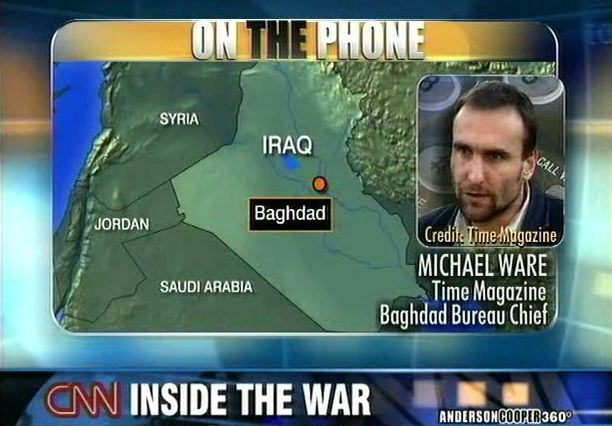AC: How are things going in Iraq?

Length: 4:22
LARGE (51.2 MB) ----- SMALL (5.0 MB)
ANDERSON COOPER: As we told you before the break, Saddam Hussein's trial was put on hold for one more week, the latest act in a trial plagued by delays and murders.
While many Americans and Iraqis are eagerly anticipating the eventual verdict, if it comes, there remains the question as to whether it will have any effect on the violence in Iraq, on the insurgents.
Earlier, I spoke by phone with "TIME" magazine's Michael Ware, who is in Baghdad and has been on the ground with U.S. troops.
(BEGIN VIDEOTAPE)
COOPER: In terms of the impact on the insurgency, what do you think that might be?
MICHAEL WARE, BAGHDAD BUREAU CHIEF, "TIME": Look, Anderson, it is absolutely zero.
I mean, this is the thing about the whole trial. The trial is essentially circus. It is a three-ring circus. It is theater. I mean, this is for Western consumption. For the Iraqis, it means nothing. For the Iraqi Shia, for the Kurds, for anyone who had been touched by Saddam's regime, there's no question of guilt. There's no question of what should happen and what will happen.
COOPER: You were just embedded with a group, the Blue Platoon, up in Ramadi. An amazing statistic I read in your article that is in "TIME" magazine this week: one in three members of this platoon have either been killed or wounded since July. That's a remarkable statistic, a terrible statistic.
What was it like being embedded with them?
WARE: It really is one of the great front lines that remains of the Iraq war.
Their convoys get hit by IEDs. They get rocket-propelled grenades. They came under coordinated simultaneous attack on five U.S. bases at once. I mean, that's what it is like out there for these guys. And that is what it's like to be with them. I mean, I got off a helicopter, and I walked straight into a city-wide firefight.
COOPER: You write in your article, "The insurgents' ability to preserve and regenerate their forces is a hallmark of the war."
I mean, there have been thousands of insurgent fatalities, but you're saying they're able to just regenerate?
WARE: We are roughly looking at 15,000 to 20,000 fighting men in the field on any one given day. Now, the significant thing is that that 15,000 or 20,000 that's in the field, it takes at least six or eight people behind that man to put him into that field. So, the support base is quite considerable.
The real thing is that that 15,000 never changes. Despite everything that the coalition does, everything the military does -- taking out Fallujah, taking out Samarra, taking out Tal Afar -- all the disruptions that it causes to the insurgents, that number stays at 15,000, 20,000.
COOPER: We are starting to hear from this White House talk that the Iraqis maybe are doing better than we had previously thought. Their security forces, their military is maybe more ready than we had thought.
There are a lot people that say, well, look, that's just politics. They're just trying to say that to set the timetable for withdrawal. From what you're seeing, from what you're hearing from the troops you have been embedded with, do they have confidence in the Iraqis they're training?
WARE: Whoever from the White House is saying that is one of two things. Clearly, they have never been in Iraq and, clearly, they have never been in a firefight with an Iraqi unit.
Secondly, they're clearly lying, whether they know it or not. I mean, a very senior U.S. military intelligence officer, one of the most high-ranking in the country, just in the last few days, said to me, "these Iraqi forces will never be in a position to be able to crush this insurgency."
On the ground here, no one has no any real illusions about that. I have been in battle with almost every type of Iraqi security force there is, from police commandos, to special forces, to 36 Commando, to the elite counterterrorism force akin to the Delta.
I have been with Kurds and Shia and Sunni. And I'm telling you, if the Iraqi security forces are the exit strategy, then get ready to be here for a long time. And your troops know that. They work with them side by side every day.
Yes, there are advances. Yes, there are gains. But will this military that's emerging here ever be able to replace the American military in Iraq? No.
COOPER: Michael Ware, it's a great article this week in "TIME."
Thanks very much.
WARE: Thanks very much, Anderson. Take care.
(END VIDEOTAPE)
COOPER: And if you get the chance, you should read the article in "TIME" magazine this week by Michael Ware, embedded with the Blue Platoon in Ramadi. It's a remarkable account of just heroic efforts by these soldiers fighting back this insurgency.
